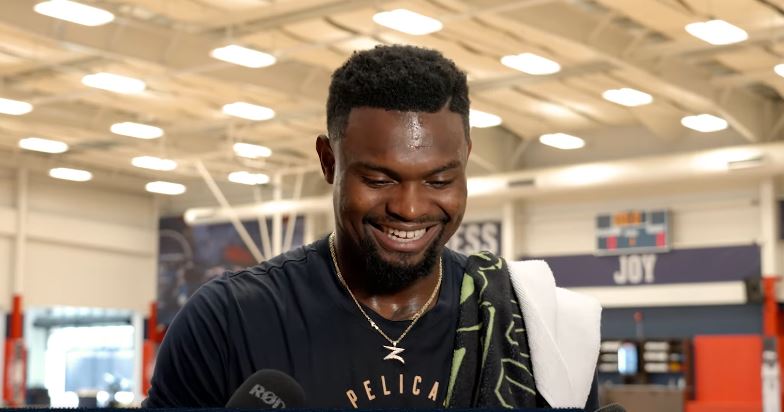
Credit: New Orleans Pelicans
Zion Williamson has undergone a remarkable physical metamorphosis. He used to be regarded as one of the NBA’s most physically intimidating players, but he has since become noticeably lighter, leaner, and more agile. Williamson disclosed during his recent media day that his current weight is 264 pounds, which is approximately 40 to 60 pounds less than his heaviest weight, which was 320 pounds. It’s not just weight loss; it’s a conscious reinvention based on self-control, introspection, and long-term goals.
As straightforward as this change may seem, it is actually a very powerful rebalancing of the body and the mind. Zion’s story over the last few years has been as much about injury setbacks as it has been about spectacular dunks. He represented unrealized potential to many of his admirers, a body so strong that it seemed to work against him. However, the discussion is now shifting. His energy has significantly increased, his steps are faster, and his silhouette is leaner on the court.
| Label | Information |
|---|---|
| Name | Zion Williamson |
| Born | July 6, 2000 — Salisbury, North Carolina, USA |
| Height | 6 ft 6 in (1.98 m) |
| Reported Peak Weight | Approximately 330 lb (149 kg) |
| Current Reported Weight | 264 lb (120 kg) — Media Day, 2025 |
| Weight Lost | Nearly 40–60 lb over six months |
| Position | Forward — New Orleans Pelicans |
| NBA Debut | 2019 — No. 1 Overall Pick |
| Training Focus | Boxing, HIIT, football-field drills, and endurance conditioning |
| Reference | Fox Sports |
“I feel like myself again,” Zion said in a confession that struck a deep chord during his media appearance. Rediscovery was at the heart of that confession, not just physicality. He is reestablishing his athletic identity by implementing a highly effective training program that incorporates sprint intervals, boxing, and functional mobility exercises. The process has been as psychological as it has been physical, shaped by accountability and renewed hunger.
Daniel Bove, the performance director for the Pelicans, was instrumental in bringing about this change. The team concentrated on improving Zion’s stamina, agility, and joint stability by utilizing biomechanical and sport science insights. One aspect of the program was especially novel: it prioritized longevity over aesthetics. The subtle genius of it is that the objective was to become durable for the sake of legacy rather than lighter for aesthetic reasons.
Memes, commentators, and the cacophony of expectations have made Zion’s weight an awkward subject in recent years. But with a confidence that spoke louder than words, this summer’s transformation put an end to the commotion. The timing was perfect, too. The Pelicans forward needed to redefine his form going into his seventh season, not just regain it. His smaller frame is the result of a deliberate compromise: he gave up bulk for balance and force for dexterity.
A particularly positive observation was made by observers at the Pelicans’ training camp. His lift appears smoother, his lateral speed has significantly increased, and he has significantly more stamina during scrimmages. His once-heavy, earthbound movements seem to have a hint of lightness now, serving as a silent reminder that controlled power rather than raw strength is frequently the source of athletic greatness.
Zion’s journey has an almost poetic irony to it. His greatest challenge was his mass, which was the very quality that set him apart. However, he may have discovered the most authentic version of his game by discarding it. A heavyweight boxer transitioning to a more agile class and finding a rhythm that feels sustainable and natural is analogous to this change. Both supporters and commentators are unquestionably thrilled but cautiously optimistic.
This change is strategic for the Pelicans organization rather than just cosmetic. The offensive geometry of the team could be significantly changed by a lighter, healthier Zion. Once unstoppable but inconsistent, his drives could now become regular, his defensive rotations more precise, and his endurance more dependable well into the fourth quarter. If this development continues, it could not only ensure his career longevity but also reestablish him as one of the most influential players in basketball.
Comparisons are common on commentary panels and social media. Both Carmelo Anthony’s mid-career conditioning pivot and LeBron James‘ offseason lean-out in Miami are remembered by analysts as having extended their primes. Although Zion’s journey seems comparable, it is in some ways more redemptive. It tells the tale of an athlete who takes back control of his own narrative by directing it toward his inner goals and away from outside distractions.
In the context of modern sports culture, where transformation stories often feel manufactured, Zion’s feels refreshingly authentic. He’s quietly constructing sustainability rather than pulling a publicity stunt. That difference is important. His composed, modest, and subtly proud manner on media day spoke louder than any dramatic press release ever could. It showed a young man who, perhaps painfully, has come to realize that greatness demands not only skill but also faith in his body, his team, and his discipline.
This story has societal resonance that goes well beyond basketball. In an age obsessed with instant results and cosmetic fixes, Zion’s journey underscores something more enduring — the art of incremental self-improvement. His advancement was gradual rather than abrupt. His transformation was introspective rather than reactive. And for that reason, it is especially motivating. He is seeking balance within himself, not approval from others.
In addition to reconditioning his body, Zion has changed the story that is told about him. He is now a representation of perseverance rather than weakness or inconsistency. It serves as a reminder that change is incredibly sustainable when motivated by purpose rather than coercion. Fans have also observed this, not just with admiration but also with identification. Many see Zion’s endeavor as a mirror of their own silent struggles with accountability, change, and resilience.
Zion’s comeback might even have an impact on a cultural change in sports, prioritizing performance over appearances and wellness over weight. The notion that patience, rather than punishment, can help an athlete grow is especially potent. Instead, it demonstrates that greatness is about discovering where balance actually exists, challenging the idea that greatness is about pushing boundaries until they are broken.
The question as the new season progresses is not whether Zion can remain healthy, but rather if he can maintain this version of himself. And he’s on the rise, if his recent performance is any guide. His tone of maturity, his lighter frame, and his increased focus all point to a player who is at last balancing his body and mind. His metamorphosis, both literally and figuratively, feels more like a fresh start than a conclusion and may shape the next ten years of his career.
In sports, as in life, real progress is rarely loud. It is slow, methodical, and insidiously unstoppable. That is aptly demonstrated by Zion Williamson’s recent weight loss from 330 pounds to a precisely calibrated 264. Gaining potential is more important than simply losing weight. And when he returns to the hardwood this season, he’s carrying something even more potent than his weight loss: evidence that evolution can be incredibly transformative when it’s accepted with sincerity.

